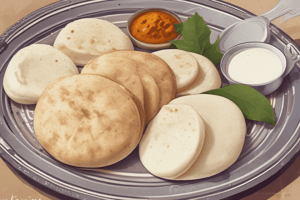Podcast
Questions and Answers
Oats are harvested as whole grains with inedible seeds.
Oats are harvested as whole grains with inedible seeds.
False (B)
Oats are not a good source of protein for growth and repair processes in the body.
Oats are not a good source of protein for growth and repair processes in the body.
False (B)
Beta-glucan is an insoluble fiber found in oats that helps regulate blood sugar levels.
Beta-glucan is an insoluble fiber found in oats that helps regulate blood sugar levels.
False (B)
Carbohydrates in oats are a source of short-lasting energy.
Carbohydrates in oats are a source of short-lasting energy.
Oats contain phytochemicals that contribute to anti-inflammatory properties and disease prevention.
Oats contain phytochemicals that contribute to anti-inflammatory properties and disease prevention.
Oat groats are the whole grains containing the germ, endosperm, and bran.
Oat groats are the whole grains containing the germ, endosperm, and bran.
Oats belong to the Poaceae grass family.
Oats belong to the Poaceae grass family.
Instant oats have a longer cooking time compared to rolled oats.
Instant oats have a longer cooking time compared to rolled oats.
Adding oat flour to baked goods can increase the gluten content.
Adding oat flour to baked goods can increase the gluten content.
The beta-glucan in oats helps lower LDL cholesterol levels by binding to bile acids in the intestine.
The beta-glucan in oats helps lower LDL cholesterol levels by binding to bile acids in the intestine.
Oats have no antioxidant properties and do not provide any protection against oxidative stress.
Oats have no antioxidant properties and do not provide any protection against oxidative stress.
Oats can only be consumed as a hot cereal and have no other culinary applications.
Oats can only be consumed as a hot cereal and have no other culinary applications.
Study Notes
Article
Oats, an ancient cereal crop, have gained popularity in recent years due to their numerous health benefits. Originating from the Poaceae grass family, oats are harvested as whole grains, with edible seeds that contain valuable nutrients. This article explores the various aspects of oats, including their nutrition benefits, types, recipes, and health properties.
Nutrition Benefits
Oats are packed with essential nutrients, providing a balanced intake of carbohydrates, protein, lipids, and various phenolic compounds, vitamins, and minerals. Some key nutrients include:
- Fiber: Both soluble and insoluble varieties, which contribute to slow digestion, increased satiety, and appetite suppression.
- Carbohydrates: A source of complex carbohydrates that provide sustained energy.
- Protein: Offering balanced amino acid profiles, essential for growth and repair processes in the body.
- Lipids: Rich in healthy fats, particularly unsaturated fatty acids, which support heart health.
- Beta-glucan: A soluble fiber found in oats that helps lower cholesterol and regulate blood sugar levels.
- Phytochemicals: Various compounds such as phenolic acids, tocols, sterols, and antioxidant avenanthramides, contributing to anti-inflammatory properties and disease prevention.
Types of Oats
There are various types of oats available, each offering unique cooking characteristics and nutrient profiles:
- Oat Groats: Whole grains containing intact germ, endosperm, and bran, which can be further processed to create different forms.
- Steel-Cut, Irish, Scottish, Rolled, Quick, Instant: Different processing methods result in varying sizes and textures, influencing the cooking time required.
- Flour: Ground whole oats or groats, suitable for baking or thickening purposes.
Recipes and Cooking Methods
Oats can be incorporated into various dishes beyond the typical hot cereal bowl:
- Overnight Oats: A convenient no-cook breakfast or snack option, made by combining old-fashioned oats with liquid and refrigerating overnight.
- Risotto: A savory dish where steel-cut or whole oats replace rice, typically cooked with aromatics, stock, and constant stirring.
- Baked Goods: Adding oat flour to recipes provides extra nutrition and texture without gluten.
- Breakfast Bowls: Topped with fresh fruit, nuts, or spices, rolled oats can be a hearty breakfast choice.
Health Properties
Oats have been associated with several health benefits:
- Cholesterol Lowering: Beta-glucan binds to cholesterol-rich bile acids in the intestine, reducing LDL cholesterol levels.
- Blood Sugar Regulation: Oat beta-glucans help regulate blood sugar by slowing down glucose absorption and stabilizing insulin secretion.
- Weight Management: High fiber content aids in weight loss by promoting feelings of fullness and controlling hunger.
- Antioxidant Activity: Phenolic compounds found in oats act as antioxidants, protecting against oxidative stress and inflammation.
- Gut Health: Soluble fibers support gut microbiota balance and promote healthy digestive function.
In conclusion, oats are not only a delicious breakfast staple but also play an important role in maintaining overall health. With various types available and numerous recipes to try, incorporating oats into your diet is both enjoyable and beneficial.
Studying That Suits You
Use AI to generate personalized quizzes and flashcards to suit your learning preferences.
Description
Explore the nutrition benefits, types, recipes, and health properties associated with oats. Learn about the essential nutrients, various forms of oats, cooking methods, and the potential health advantages of incorporating oats into your diet.




